― Announcing “Causal AI Assistant”: AI That Inherits and Evolves Expertise ―
Combining the Strengths of AI Agents and Causal AI ― An Innovative Approach to Leveraging Organizational Knowledge and Addressing Talent Shortages
Integrating the strengths of AI Agents and Causal AI to enable advanced
autonomous causal modeling and conversational UI.
VELDT Inc. (Headquarters: Tokyo, Japan; CEO: Jin Nonogami) today announced the launch of its new “Causal AI Assistant” function and professional implementation services for its proprietary Causal AI platform, xCausal™. The Causal AI Assistant allows companies and organizations to model the expertise and insights of skilled professionals as causal relationships that can be digitally utilized across the organization.The Causal AI Assistant will be rolled out starting January 2026, while professional services for implementation and customization are available immediately.
Until now, even with the use of AI, it has been difficult to effectively preserve and transfer the advanced expertise and know-how accumulated within organizations. Conventional approaches using generative AI or Retrieval-Augmented Generation (RAG) alone have proven insufficient. While generative AI can handle vast amounts of information, it generates responses purely based on patterns and probabilities—making it prone to occasional inaccuracies or hallucinations. In contrast, human experts make decisions grounded in causal reasoning—understanding why certain results occur—which allows them to reach conclusions that are both reproducible and explainable. Modeling this causal knowledge provides an effective way to structure specialized expertise, including tacit knowledge, and transform it into a form that can be utilized across the organization. However, building causal inference models traditionally required advanced technical skills and significant time. With this latest update, organizations can now seamlessly capture and utilize scattered expertise—both internal and external—as digital, causal relationship–based models, enabling unprecedented speed and accuracy in preserving and leveraging organizational knowledge.
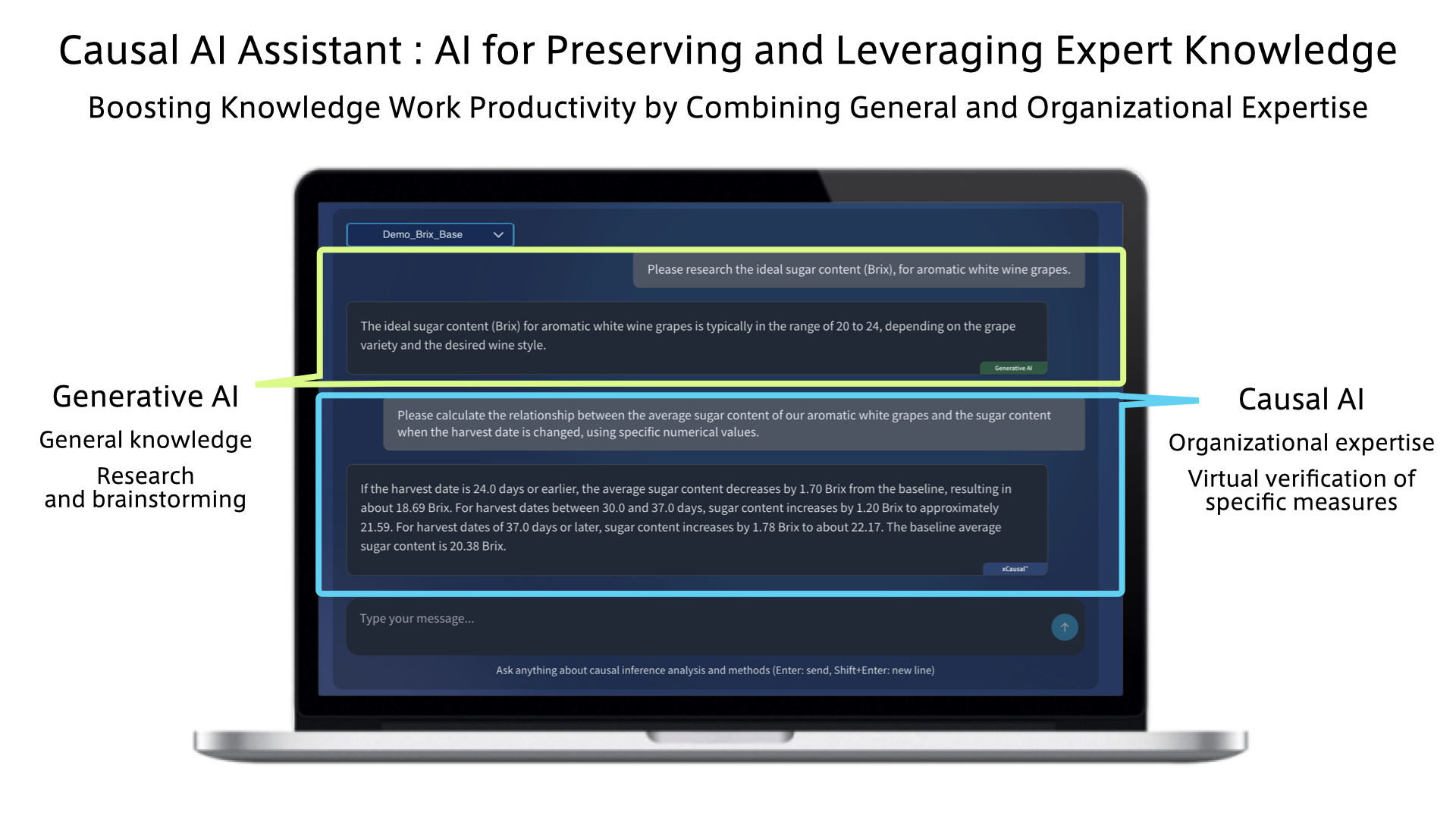
■ Background : Japan’s Growing Knowledge Succession Challenge
According to Japan’s Ministry of Internal Affairs and Communications, the country’s working-age population (ages 15–64) is expected to decrease to 52.75 million by 2050—a roughly 30% drop from 2021. This demographic decline, coupled with labor shortages, poses severe risks for the transmission of skills and expertise, especially in manufacturing and research-intensive industries. More than half of Japanese manufacturing companies cite knowledge transfer as a key management challenge, with the loss of tacit knowledge from retiring experts threatening operational and innovation capabilities.
■ Why Causal AI is Needed Beyond Generative AI
While generative AI (large language models, or LLMs) has revolutionized text generation and information retrieval, its probabilistic nature makes it prone to “hallucinations” and inconsistent answers. Researchers at MIT and Harvard have referred to this issue as “Potemkin understanding”—where AI appears to understand but often fails in practical reasoning. In contrast, human experts reason based on causal relationships—understanding not just what happens, but why it happens. By modeling such causal reasoning digitally, organizations can achieve explainable, reproducible, and condition-aware decision-making that goes beyond pattern-based AI.
(https://arxiv.org/abs/2506.21521)
The root of this issue lies in the fact that generative AI relies on probabilistic outputs. As a result, it may produce different answers to the same question each time, and it struggles with tasks that require reproducibility, such as mathematical calculations. This limitation is considered one of the key challenges that must be addressed in the pursuit of artificial general intelligence (AGI) with human-like reasoning capabilities.
By contrast, experts with advanced technical skills understand the structural relationships between cause and effect. Rather than predicting what is likely to happen, they focus on why it happens—enabling them to derive conclusions that remain consistent, explainable, and adaptable to changing conditions.By modeling this causal knowledge and making it accessible across the organization, companies can preserve and apply institutional expertise more effectively, thereby advancing the sophistication of both management and on-site decision-making.
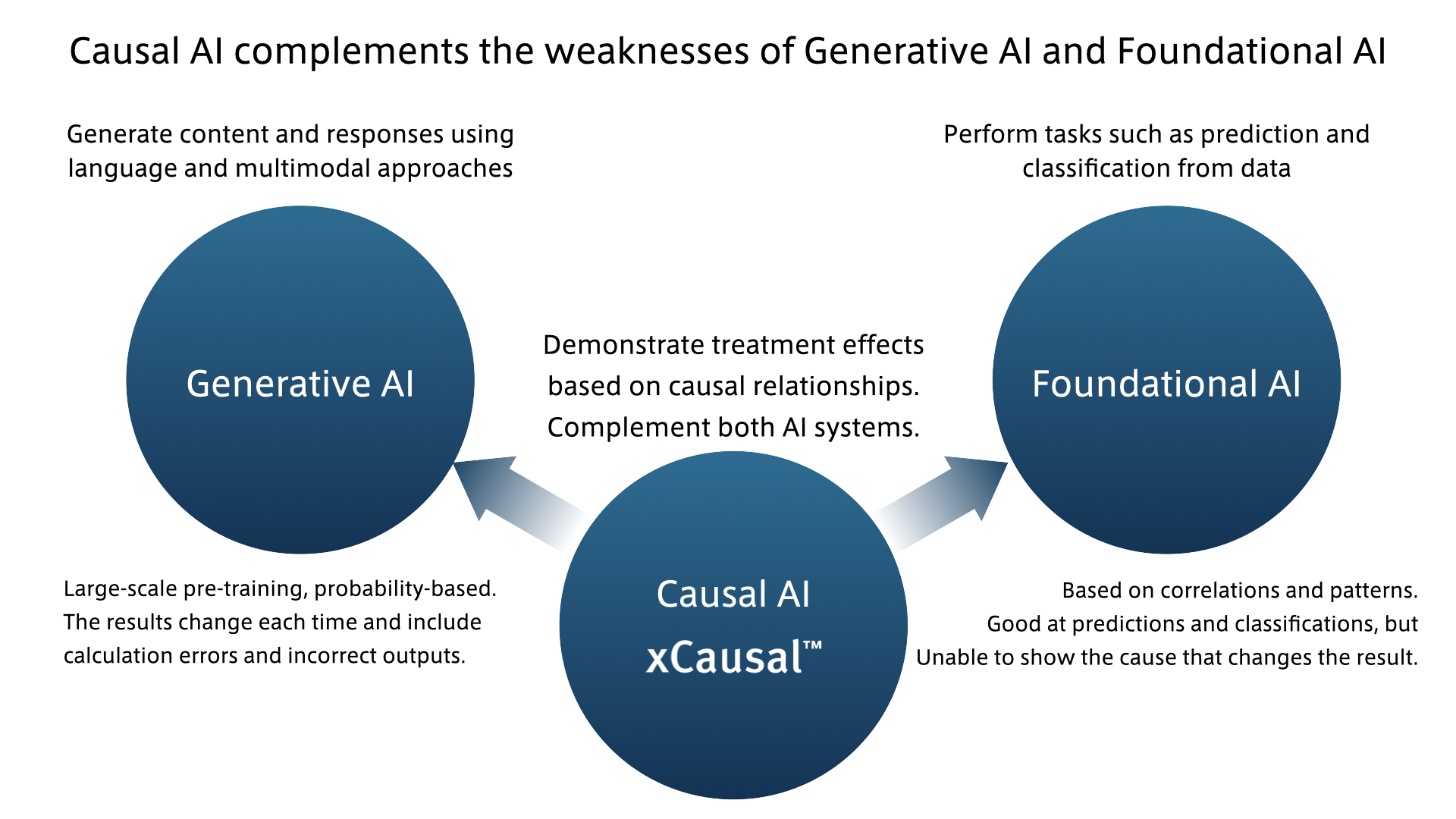
■ Solution: Turning Causal Models into “Digital Experts”
VELDT’s Causal AI platform xCausal™ and its professional services organize the expertise of skilled professionals and specialists into causal relationship models. These models structure the relationships among contextual conditions and circumstances (confounders/covariates), actions or interventions taken (treatments variables), and the resulting outcomes or effects (outcome variables). In addition, xCausal™ can incorporate academically validated causal relationships extracted from reliable data sources—such as research papers and technical dictionaries—through natural language–based causal knowledge extraction technology. Furthermore, the system can discover previously unknown relationships directly from data, model expert decision-making processes, and digitally reproduce human expertise that has traditionally been tacit or experience-based.
This enables organizations to effectively embed what could be called a “digital expert” within their operations—an AI that can provide answers equivalent to asking a veteran professional or specialist, such as “Why did this result occur?” or “What should be done in this situation?” These responses are delivered with both reproducibility and explainability, ensuring consistent and trustworthy reasoning. Moreover, by continuously updating the underlying data, the system can further evolve and enhance its knowledge over time.
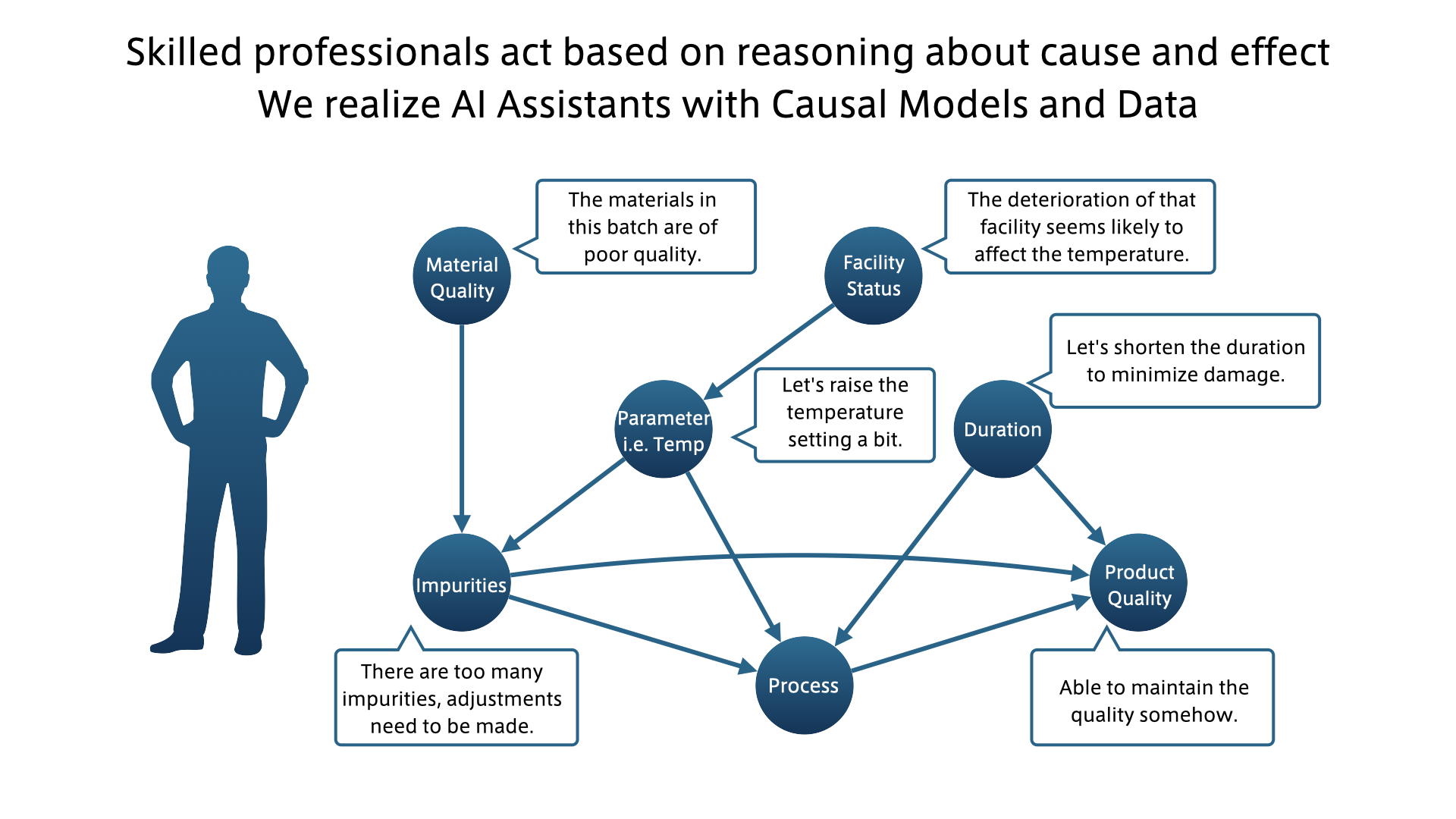
■ Causal AI Assistant: Three Core Functions and Professional Services
The Causal AI Assistant autonomously discovers, refines, and applies causal models through the collaboration of multiple AI agents. It extracts known causal relationships from expert knowledge, uncovers previously unknown connections through robustness evaluation and variable exploration, and presents highly reliable models to administrators. The system then learns from human feedback to continuously improve its performance. This Human-in-the-Loop design enables the causal models to evolve and enhance their quality over time. In preparation for implementation, VELDT also offers a range of professional services that analyze and structure causal knowledge obtained from experts. These services include identifying the necessary variables, designing causal rules, and modeling the thought processes of highly skilled professionals—forming the foundation for accurate and effective causal modeling.
1. Causal Knowledge Extraction Agents
Known causal relationships can be automatically extracted from text data such as documents and operational materials, and applied as predefined rules.In addition to causal insights obtained directly from experts, the system can also incorporate systematically established knowledge from reliable sources.Application of these causal rules to the model is carried out under the supervision and validation of domain experts.
2. Autonomous Causal Modeling Agents
This group of agents operates autonomously under the coordination of an orchestrator agent, which manages and integrates multiple causal inference agents. In addition to utilizing known causal models, the system identifies and supplements highly probable unknown causal relationships and confounding factors based on robustness evaluation results. Depending on user needs, it can also present analytical outputs such as CATE (Conditional Average Treatment Effect) and RCA (Root Cause Analysis), while autonomously engaging in iterative hypothesis testing and model refinement through interactive feedback with administrators. By automating processes that traditionally required manual trial and error—such as discovering, verifying, and updating causal relationships—these agents enable causal model construction and evolution at unprecedented speed and precision.
3. Causal RAG (Retrieval-Augmented Generation)
Utilizing approved causal models—referred to internally as “Causal Assets”—the system provides evidence-based answers and counterfactual scenario simulations through an interactive user interface. This allows general users to instantly gain causal insights, just as if they were consulting directly with a domain expert. Furthermore, through forthcoming APIs, the system will continuously monitor connected external and real-time data, automatically detecting any changes reflected in the causal models. As a result, it can autonomously identify early signs of risk and proactively recommend countermeasures or improvement opportunities.
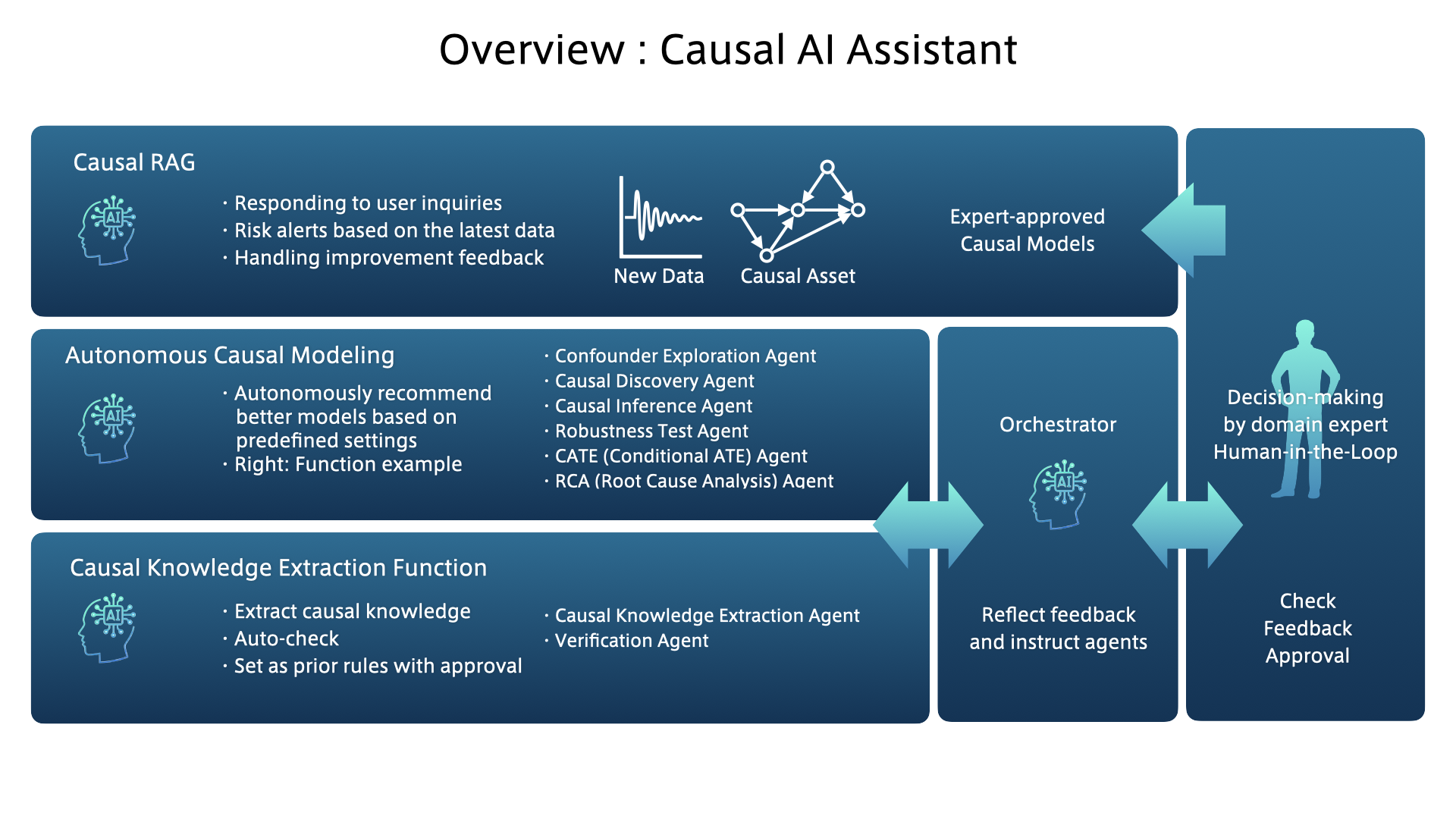
■ Expected Benefits
⚫︎ Knowledge Succession and De-Personalization
By functionalizing the decision-making processes of veteran professionals and experts as causal models, organizations can preserve and develop expertise that is no longer dependent on individual personnel—ensuring continuity beyond retirements or transfers. This enables a wider range of employees to leverage the know-how of highly skilled experts—knowledge that is often difficult to access due to time constraints—while evolving it into shared organizational intelligence. As a result, companies can achieve reproducibility and consistency in complex tasks such as development, troubleshooting, and operational decision-making.
⚫︎ Explainable Decision-Making
The system visualizes “why” a particular conclusion was reached through a causal relationship model—referred to as a Causal Asset—which clearly illustrates the underlying assumptions and causal pathways behind each outcome. This enables both management and on-site personnel to explain the basis of their decisions to third parties, enhancing transparency and credibility both inside and outside the organization. Moreover, by quantifying the relationship between actions and their effects with concrete numerical indicators, the system accelerates problem-solving, prioritization of investments, and the overall decision-making process.
⚫︎ Enhanced Synergy with Generative AI
Because the Causal AI Assistant retains both the organization’s own experiential knowledge and highly reliable domain-specific insights, it can work in tandem with generative AI—leveraging its strength in broad knowledge exploration and idea generation—to simulate concrete, organization-specific strategies.This enables evidence-based reasoning in intellectual tasks such as business planning and problem-solving, thereby enhancing the sophistication and efficiency of knowledge-driven work while expanding the overall value of AI utilization across the enterprise.
⚫︎ Intelligent Engine for IT Services
By integrating the Causal AI Assistant with real-time data updates, organizations can perform risk detection and deliver personalized recommendations based on cause-and-effect relationships.Through integration with a wide range of IT services—including healthcare, manufacturing, finance, and logistics—the system can provide unprecedented added value and new forms of intelligence across industries.
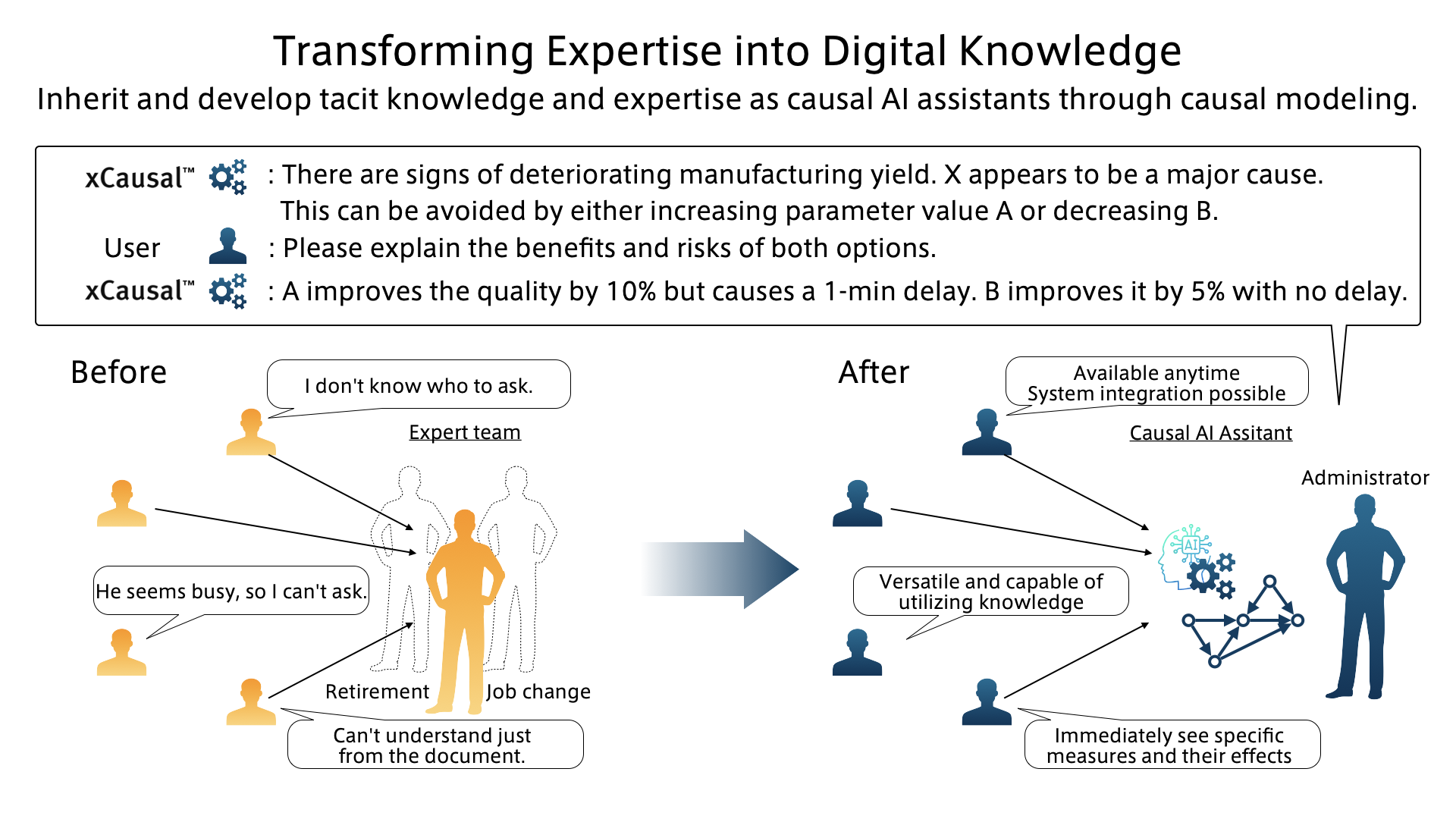
■ Comment from Dr. Masatoshi Imaizumi, Associate Professor, Graduate School of Arts and Sciences, The University of Tokyo
“As AI continues to advance in knowledge aggregation and decision support, ensuring the reliability of AI-generated outputs remains a major challenge. The causal inference technology announced by VELDT enhances both the interpretability and reliability of AI by internally constructing and continuously updating structured causal models. This approach effectively complements the weaknesses of modern AI and represents a model case for how causal reasoning can be applied to future AI systems.”
■ About xCausal™
Website : https://xcausal.com/
xCausal™ is a SaaS-based Causal AI platform designed for business users—no coding or data science expertise required. It incorporates VELDT’s proprietary intelligence technologies, including Smallytics™ (causal variable recommendation technology) and CKE-LLM (causal knowledge extraction large language model). By combining multiple selectable causal discovery techniques with causal inference based on Structural Causal Models (SCM), xCausal™ enables users to verify hypothetical causal effects within minutes. This accelerates research and development cycles, improves experimental success rates, and allows organizations to maximize the productivity of their top talent. Through continuous enhancement using AI-based reliability evaluation technologies, xCausal™ transforms causal models into digital knowledge assets that can be utilized systemically across the organization. VELDT also provides comprehensive professional services to support every stage of this process—from implementation to optimization.
■ About VELDT Inc.
VELDT Inc. is a data science company dedicated to developing data analytics technologies that accelerate social problem-solving and promote what we call “Goodwill Innovation.” While many mainstream AI technologies today operate as black-box systems—making it difficult to explain the reasoning behind their outputs—fields such as decision-making, problem-solving, and research and development require a white-box approach that enables interpretation and explanation of how results are derived. By combining the strengths of causal, white-box technologies with correlation-based, black-box AI, VELDT provides innovators with “trustworthy AI” that delivers both performance and transparency. Rather than merely pursuing technological advancement, VELDT aims to redefine how humanity engages with technology, creating a positive spiral between human society and the global environment.
| CEO: | Jin Nonogami |
| Headquarters: | 5-18-10 2-D Jingumae, Shibuya-ku, Tokyo |
| Established | August 1, 2012 |
| URL | https://veldt.jp/en/ |